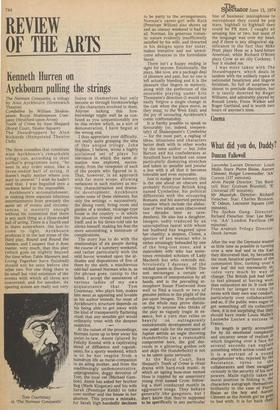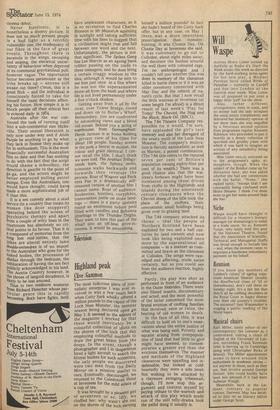Cinema
What did you do, Daddy?
Duncan Fallowell
Lacombe Lucien Director: Louis MaIle. Stars: Pierre Blaise, Aurore Clement, Holger Lowenadler. 'AA' Curzon (137 minutes).
Alvin Purple Director: Tim Burstall. Star: Graham Blundell. 'X' Universal (87 minutes). Mr Majestyk. Director: Richard Fleischer. Star: Charles Bronson. 'X' Odeon, Leicester Square (103 minutes). The Spikes Gang. Director: Richard Fleischer. Star: Lee Marvin. 'AA' London Pavilion (96 minutes). , The Arabian Trilogy Director: Derek Jarman.
After the war the Germans wasted as little time as possible in turning over a new leaf and in the East they discovered that, by becoming the most fanatical partisans of the communist bloc, turning over a new leaf did not necessarily involve very much by way of change. The British just had time to feel pleased at having won; then exhaustion set in. It took the French far longer to come to terms with their own war conduct, particularly over collaboration; and so, if the public were eager to get something off its collective chest, it is not surprising that they should have made Louis Malle's Lacombe Lucien a success in France.
Its length is partly accounted for by its emotional complexitY and uncanny sense of realism in which lingering over a face fp( several seconds can explain something which action could not. It is a portrait of a young sharpshooter who, rejected by the Resistance, turns to the collaborators and then swagged viciously in the security of his neW powers. Matte rightly takes n° moral position in filming it, the characters autograph themselves' brilliantly in the case of Pierre Blaise as the boy and Aurore Clement as the Jewish girl he goes to bed with. It is for both their
cinema debut.
Never histrionic, it is nonetheless a doomy picture. It does not so much present people in a bad light as a terribly vulnerable one, the inadequacy of our fibre in the face of great events. Throughout there is paranoia in the wings, snooping and sniping, the electrical uncertainty of behaviour when deprived ot its communal gravitational pull, however vague. The opportunist factor becomes paramount as the tribe breaks up – anyone still awake out there? c'mon, this is a great flick – and the individual is consciously forced to take for himself the basic decisions affecting his future. How simple it is to knock people off their ethical feet is evinced daily in 1974.
Australia after the war continued the task of turning itself into a sub-continental size Hicksville. Their sexual liberation is only now under way and if Alvin Purple be anything to go by what they lack in finesse they make up for in enthusiasm. This is the most financially successful Australian film to date and that has nothing to do with the fact that the script would shame a schoolboy, the direction is gauche to the point of go-go, and the actors might be better employed pulling petrol Pumps. Even the Australians, one would have thought, could have Made a more sophisticated job of it than this.
It is a sex comedy about a stud service (in a country that treats its Women like door stoppers!) oPerating behind the screen of Psychiatric therapy and apart from a couple of witty lines in the COurtroom has absolutely no cri tical points in its favour. That it is a compound of memories from the hg lost mid-'sixties, that the Jokes are almost entirely lame double-entendres is of no import to the Australian who goes for the naked bodies, the procession of sheilas through the bedroom, the exhilaration of having the sex fact Publicly acknowledged in his land.
The Auntie Country however, in the throes of languid decadence, is likely to be less amused.
Thus to two mediocre westerns lr,om Richard Fleischer whose par ticular genre this is rapidly becoming. Both have fights, both
have unpleasant characters, so it is no revelation to find Charles Bronson in Mr Majestyk squinting in sunlight and taking sufficient time with his lines to suggest that a civilisation might rise and fall. .between one word and the next. Unfortunately, the picture is not that significant. The Spikes Gang has Lee Marvin as an ageing bank robber passing on the trade to three teenagers, and he does bring a certain craggy wisdom to the idea, although it would be nice to see him just once in a film where he was not the superannuated know-all from the bush and where life is not lived permanently under a five o'clock shadow.
Getting away from it all by the river, over Tower Bridge, round and down on to Butler's Wharf, Bermondsey, you are confronted by astonishing views and a blood red sunset. Behind you a string of warehouses from Gormenghast: Derek Jarman is at home holding a private view of his films' for about 150 people. Sunday scenes in the park, a Seurat in motion, the colour and grain identical: I cannot recall the title, I don't think we were told. The Arabian Trilogy: sands burn, the Sphinx melts, someone walks backwards and forwards then reverses the process. Roar of Wagner and Puck eyes Pan in a dramatically selfcensored version of another film I cannot name. Roar of audience. Soubrettes, hustlers, coryphees, transvestites jostle on stone landings — there is a party upstairs round an enormous indoor pool filled with candles and Bohemia jitterbugs to the Thunder Thighs. They want to turn this part of the wharf into an off-beat drive-incinema. It would be astonishing.



































 Previous page
Previous page